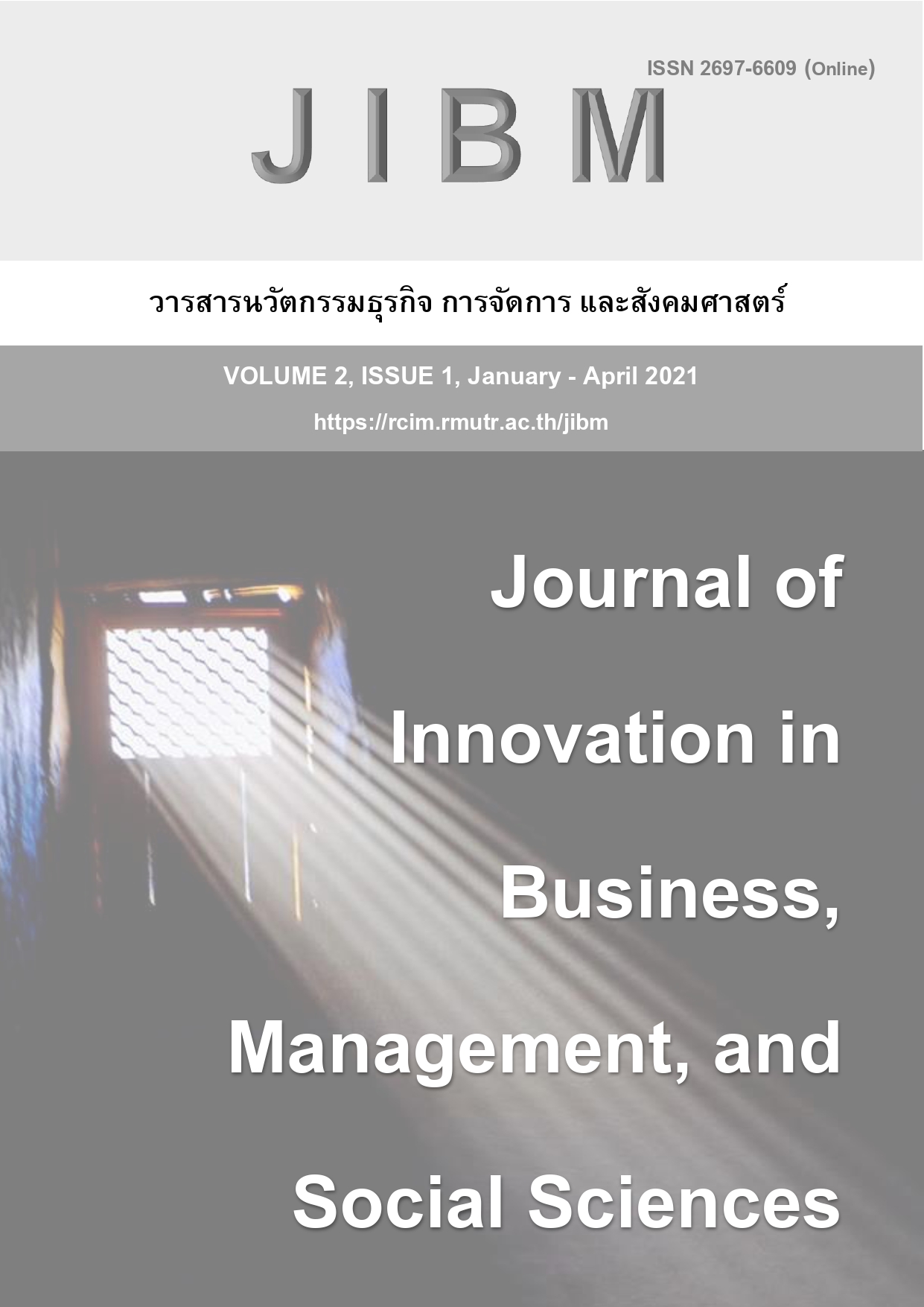Social Media Monitoring Behavior and Relationship Quality in Organizational Contents
คำสำคัญ:
Facebook, relationship quality, interpersonal communication, social networking service (SNS), relational communication, workplace, uncertainty reduction theoryบทคัดย่อ
This quantitative study aims to investigate the dynamism of interpersonal relationship in workplace context in evolving environment of a social networking service (SNS), or social media, particularly Facebook. Therefore, the major research question was “What are the influences of Facebook monitoring on the partners’ activities on relationship quality at workplaces?”. Conceptual frameworks included (1) uncertainty reduction, (2) usage of Facebook, and (3) relationship quality. Selected by a snowball-sampling technique, samples were those who (1) were currently employed and operating in any workplace, (2) had a Facebook account with at least 5 or more of their colleagues in their friend list, and (3) lived in Bangkok. Questionnaires were distributed on-line, of which 213 were completed and returned, and the data were statistically analyzed—regression analysis. Results indicated that (1) monitoring Facebook activities of the romantic partners did not decrease satisfaction in their current relationship, (2) increased monitoring of Facebook activities of the partners did not lead to a greater uncertainty in their relationship, (3) greater uncertainty in a relationship adversely affected relationship quality, (4) greater satisfaction in a relationship correlated with greater relationship quality, and (5) increased monitoring of Facebook activities did not negatively correlate with relationship quality. Implications are that Facebook has enormous influences, positively and vice versa, in relationship quality at workplaces and needs to be further studied.
เอกสารอ้างอิง
Antheunis, M. L., Valkenburg, P. M., & Peter, J. (2010). Getting acquainted through social network sites: Testing a model of online uncertainty reduction and social attraction. Computers in Human Behavior, 26(1), 100-109. doi:http://dx.doi.org/10.1016/j.chb.2009.07.005
Ayres, J. (1979). Uncertainty and social penetration theory expectations about relationship communication: A comparative test. Western Journal of Speech Communication, 43(3), 192-200. doi:10.1080/10570317909373968
Baym, N. K., Zhang, Y. B., Kunkel, A., Ledbetter, A., & Lin, M.-C. ( 2007 ). Relational quality and media use in interpersonal relationships. New Media & Society, 9(5), 735-752. doi:10.1177/1461444807080339
Berger, C. R., & Calabrese, R. J. (1975). Some explorations in initial interaction and beyond: toward a developmental theory of interpersonal communication. Human Communication Research, 1(2), 99-112. doi:10.1111/j.1468-2958.1975.tb00258.x
Bevan, J. L. (2004). General partner and relational uncertainty as consequences of another person's jealousy expression. Western Journal of Communication, 68(2), 195-218. doi:10.1080/10570310409374796
Clayton, R. B., Nagurney, A., & Smith, J. R. (2013). Cheating, breakup, and divorce: Is Facebook use to blame? Cyberpsychology, Behavior, and Social Networking, 16(10), 717-720. doi:10.1089/cyber.2012.0424
Ellison, N., Heino, R., & Gibbs, J. (2006). Managing impressions online: Self-presentation processes in the online dating environment. Journal of Computer-Mediated Communication, 11(2), 415-441. doi:10.1111/j.1083-6101.2006.00020.x
Elphinston, R. A., & Noller, P. (2011). Time to face it! Facebook intrusion and the implications for romantic jealousy and relationship satisfaction. Cyberpsychology, Behavior, and Social Networking, 14(11), 631-635. doi:10.1089/cyber.2010.0318
Gibbs, J. L., Ellison, N. B., & Heino, R. D. (2006). Self-presentation in online personals: The role of anticipated future interaction, self-disclosure, and perceived success in Internet dating. Communication Research, 33(2), 152-177. doi:10.1177/0093650205285368
Gibbs, J. L., Ellison, N. B., & Lai, C. H. (2011). First comes love, then comes Google: An investigation of uncertainty reduction strategies and self-disclosure in online dating. Communication Research, 38(1), 70-100. doi:10.1177/0093650210377091
Gonzales, A. L., & Hancock, J. T. (2010). Mirror, mirror on my Facebook wall: Effects of exposure to Facebook on self-esteem. Cyberpsychology, Behavior, and Social Networking, 14(1-2), 79-83. doi:10.1089/cyber.2009.0411
Goodboy, A. K., Myers, S. A., & Members of Investigating, C. (2010). Relational quality indicators and love styles as predictors of negative relational maintenance behaviors in romantic relationships. Communication Reports, 23(2), 65-78. doi:10.1080/08934215.2010.511397
Hand, M. M., Thomas, D., Buboltz, W. C., Deemer, E. D., & Buyanjargal, M. (2012). Facebook and romantic relationships: intimacy and couple satisfaction associated with online social network use. Cyberpsychology, Behavior, and Social Networking, 16(1), 8-13. doi:10.1089/cyber.2012.0038
Hawn, C. (2009). Take two aspirin and tweet me in the morning: How Twitter, Facebook, and other social media are reshaping health care. Health Affairs, 28(2), 361-368. doi:10.1377/hlthaff.28.2.361
Hendrick, S. S. (1988). A generic measure of relationship satisfaction. Journal of Marriage and Family, 50(1), 93-98. doi:10.2307/352430
Knobloch, L. K., & Solomon, D. H. (1999). Measuring the sources and content of relational uncertainty. Communication Studies, 50(4), 261-278. doi:10.1080/10510979909388499
Morgan, T., Salitsky, M., Stutzer, K., & Thomas, J. (2016). When more information does not help: The connection between Facebook monitoring behavior, relationship uncertainty, and relationship quality. Paper presented at the Communications Studies Student Scholarship. http://scholarworks.umt.edu/communications_students/1
Muise, A., Christofides, E., & Desmarais, S. (2009). More information than you ever wanted: does Facebook bring out the green-eyed monster of jealousy? CyberPsychology & Behavior, 12(4), 441-444. doi:10.1089/cpb.2008.0263
Norton, R. (1983). Measuring marital quality: A critical look at the dependent variable. Journal of Marriage and Family, 45(1), 141-151. doi:10.2307/351302
Rau, P. L. P., Gao, Q., & Ding, Y. (2008). Relationship between the level of intimacy and lurking in online social network services. Computers in Human Behavior, 24(6), 2757-2770. doi:10.1016/j.chb.2008.04.001
Sheldon., P. (2008). Student favorite: Facebook and motives for its use. Southwestern Mass Communication Journal, 23(2), 39-53. doi: 10.4324/9781315883458
Socialbakers. (2013). Top 10 Biggest Facebook Cities. Retrieved from https://www.socialbakers.com/blog/647-top-10-biggest-facebook-cities
Statista. (2016). Number of monthly active Facebook users worldwide as of 2nd quarter 2016 (in millions) Retrieved from https://www.statista.com/statistics/264810/number-of-monthly-active-facebook-users-worldwide/
Stewart, M. C., Dainton, M., & Goodboy, A. K. (2014). Maintaining relationships on facebook: Associations with uncertainty, jealousy, and satisfaction. Communication Reports, 27(1), 13-26. doi:10.1080/08934215.2013.845675
Theiss, J. A., & Solomon, D. H. (2008). Parsing the mechanisms that increase relational intimacy: The effects of uncertainty amount, open communication about uncertainty, and the reduction of uncertainty. Human Communication Research, 34(4), 625-654. doi:10.1111/j.1468-2958.2008.00335.x
Tong, S. T., Van Der Heide, B., Langwell, L., & Walther, J. B. (2008). Too much of a good thing? The relationship between number of friends and interpersonal impressions on Facebook. Journal of Computer-Mediated Communication, 13(3), 531-549. doi:10.1111/j.1083-6101.2008.00409.x
Yang, C. C., Brown, B. B., & Braun, M. T. (2014). From Facebook to cell calls: Layers of electronic intimacy in college students’ interpersonal relationships. New Media & Society, 16(1), 5-23. doi:10.1177/1461444812472486



